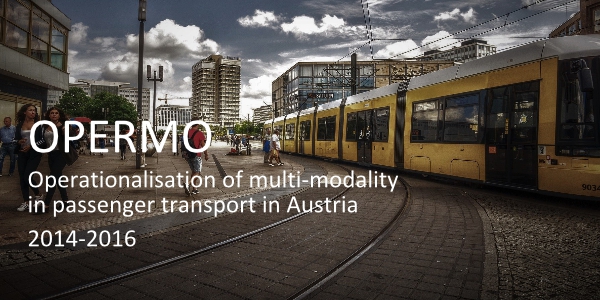OPERMO

Up to now there has been no uniform definition of multimodality in passenger transport, which meant that studies on multimodal mobility were not comparable and generally valid relationships were hardly identifiable. In addition, there is currently a (often normative) discussion of the meaning of multimodality in terms of mobility behaviour, its measurement or measurability and on aspects relevant to forecasting. The opinions of science, politics and administration differ, especially with regard to the claim to evaluate multimodality from an ecological point of view. Within the framework of the OPERMO project, a uniform definition of multimodality was developed and defined, and a monitoring system for monitoring multimodal-mobility behaviour was developed, tested on real mobility data and formalized. All contents and results of OPERMO were developed with the broad involvement of the professional community.
Client: bmvit, mobility of the future, 2nd call for tenders
Duration: March 2014 to February 2016 (24 months)
Project partners: Vienna University of Technology, komobile w7 GmbH, FACTUM Chaloupka & Risser OG
Project description:
At the beginning of the project, a theoretical framework was developed which serves as a basis for a better understanding of multimodality in passenger transport with the three dimensions “offer”, “attitude” and “behaviour”. Based on this better understanding of multimodality, OPERMO developed an operationalisation system that takes these three dimensions of multimodal mobility into account in order to make them comprehensible, measurable and interpretable. This OPERMO operationalisation system represents the basic framework of the developed monitoring system for multimodality, which makes it possible to describe multimodality in different levels of detail according to indicators. There are no spatial restrictions for the application of the OPERMO operationalisation system. For example, the OPERMO operationalisation system can be used for surveys in both rural communities and large cities. Depending on the (complexity) requirements (e.g. statements to be made as a result of a survey, target groups to be included etc.) and the availability of resources within the framework of a survey, it is possible to adapt the operationalisation system to the respective survey design.
The OPERMO monitoring system is to be understood as a theoretical toolbox that applies the OPERMO operationalisation system depending on the survey interest or framework and thus covers different levels of multimodal-mobility behaviour. The basis for monitoring is provided by the basic definitions of multimodality in the dimensions “offer”, “attitude” and “behaviour” that have been developed and defined in OPERMO. If indicators that cover or explain multimodality beyond the basic definition are to be used, a specification by means of a research hypothesis and question and consequently, the formulation of a more detailed / specific definition is required.
The OPERMO monitoring system enables the systematic investigation of whether and if so, how (over which observation period, which distance, with which means of transport etc.) people move (multimodally), which (multimodal) mobility offers are available to them and what attitudes they have to multimodal-mobility behaviour. If this is applied periodically, developments and trends in multimodal-mobility behaviour can be read from these results. Only through these definitions and the case-specific application of the OPERMO monitoring system can, for example, the claim to evaluate multimodality from an ecological point of view be fulfilled intersubjectively, comprehensibly and justifiably.
The “Multimodality Handbook”, also developed in the OPERMO project, describes the theoretical framework for taking multimodality into account in mobility surveys. It is a summary paper aimed primarily at people in disciplines of professional relevance who already have experience in the field of mobility surveys and wish to record and/or monitor multimodality. The Multimodality Handbook is deliberately not a “cooking recipe” as it would either go far beyond the scope of the project or would have required too much restriction to certain survey objectives, survey methods, indicators etc.
Contact: DI Dr. Alex Neumann, MA MSc
